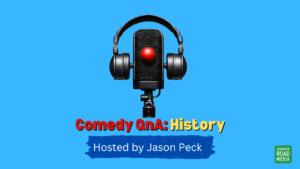Being able to incorporate humour into your speeches is greatly going to help you become a popular and sought after speaker.
People always love it when a speaker can make them laugh. It especially helps when you can tie your humour into your speech topic, so that your message is better remembered.
Let me give you a bit more of a background to my experiences with performing comedy before I tell you about a great resource that I’ve come across.
Here’s a direct link Stand-up Comedy Fast Start Guide.
Here’s a little background for you. I originally did stand-up comedy for two years on the London circuit in the U.K.
I stopped performing, mainly because I got tied of trawling virtually the same 5-10 minute act around for those two years. My routines changed during that time, but my Stand-up Comedy act essentially remained unchanged.
I had no set approach for when I should develop more stand-up comedy material or how to develop it.
The stand-up comedians that I met during this time, and the advice I got given, could not tell me when my 5-minute set was “finished” and when I should create another five minutes – slowly working my way up the “stand-up comedy ladder.”
I often asked myself:
- “how do I quantify a really funny comedy act?”
- “does the audience have to be laughing constantly?”
- “or is it okay for them to be laughing less often?”
I’d had seen comedians makes audiences gasp for breath and also ones that had an audience laughing, but not as frequently. And I’m not talking about bad open mike comedians either.
Towards the end of those two years I had lost all my passion for my material. I stopped enjoying writing jokes and something I couldn’t believe…
I actually stopped enjoying the performing!
I’d read countless books on stand-up comedy writing and I couldn’t make them work for me. Friends and audience members would say to me:
“hey, I like you’re stuff you sound really well-rehearsed and scripted.”
That was a nice back-handed compliment.
But no matter what method I used, my comedy material sounded exactly like that… material.
I sounded scripted because that’s what I was. I wrote material so that it looked good on paper, without it necessarily being good when I delivered it. But I wanted to find a way to truly capture my own sense of humour.
I kept reading in books that I had to write about 50 jokes a day, as I’m sure you have, and you have to throw out the rubbish ones and then write new ones.
I’m sure you understand the “panning for gold” theory behind this,like I do, but that’s a tonne of work! Especially when I don’t put that much effort into making people laugh in my day-to-day conversation. I mean how much effort do you put in to making people laugh in casual conversation? Probably not much, right? It just flows out of you.
Besides, the top gag writers in the world of comedy have been doing this for years, right? But in all honesty, by this point, I was disgusted with the whole process. I’m sure you’ve probably been in a similar situation.
I always found it a bit weird to write that many jokes in isolation from one another, then determine which ones did not work, and then wave them into a routine hoping that it would sound natural and be funny.
I was constantly being told I was much funnier in real life. But with the approach I had been using I couldn’t capture my natural sense of humour.
So you can imagine how frustrating and soul destroying this whole stand-up comedy game had become for me.
But all this was to change when I discovered the Stand-up Comedy Fast Start Guide. Read my review of that product here: Stand-up Comedy Fast Start Guide review
Note: There are affiliate links on this page. That means that if you make a purchase via my link I get paid a commission. It helps me pay the bills!



